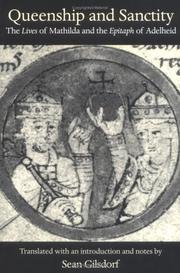| Listing 1 - 3 of 3 |
Sort by
|
Book
ISBN: 9004264590 9789004264595 1306493587 9781306493581 9789004264588 9004264582 Year: 2014 Volume: 23 Publisher: Leiden Boston
Abstract | Keywords | Export | Availability | Bookmark
 Loading...
Loading...Choose an application
- Reference Manager
- EndNote
- RefWorks (Direct export to RefWorks)
The Favor of Friends offers the first book-length exploration of intercession—aid and advocacy by one individual or group in behalf of another—within early medieval aristocratic societies. Drawing upon a variety of disciplines and historiographical traditions, Sean Gilsdorf demonstrates how this process operated, and how it was ideologically elaborated, in Carolingian and Ottonian Europe, allowing individuals and groups to leverage their own, limited interpersonal networks to the fullest, produce new relationships, gain access to previously closed spaces, and generate interest in their agendas from those able to effect change. The Favor of Friends enriches our understanding of early medieval politics and rulership, offering a model of political interaction in which hierarchy and comity do not stand in ideological and pragmatic tension, but instead work in integrated and mutually-reinforcing ways.
Aristocracy (Social class) --- Intercession --- Political culture --- Carolingians. --- Interceding --- Interpersonal relations --- Carlovingians --- Carolinians --- Culture --- Political science --- Aristocracy --- Aristocrats --- Upper class --- Nobility --- History --- France --- Holy Roman Empire --- Germany --- Aristocratie --- Culture politique --- Carolingiens --- Histoire --- Saint Empire romain germanique --- Fürbitte. --- Politische Kultur. --- Europa. --- Carolingians --- Aristocracy (Social class) - Europe - History - To 1500 --- Intercession - Europe - History - To 1500 --- Political culture - Europe - History - To 1500 --- Holy Roman Empire - History - Saxon House, 919-1024 --- France - History - To 987

ISBN: 0813216087 9780813216089 0813213746 9780813213743 Year: 2004 Publisher: Washington, D.C. Catholic University of America Press
Abstract | Keywords | Export | Availability | Bookmark
 Loading...
Loading...Choose an application
- Reference Manager
- EndNote
- RefWorks (Direct export to RefWorks)
Book
ISBN: 1641894466 1802700153 9781802700152 9781641894463 Year: 2022 Publisher: Leeds
Abstract | Keywords | Export | Availability | Bookmark
 Loading...
Loading...Choose an application
- Reference Manager
- EndNote
- RefWorks (Direct export to RefWorks)
In the last decade, the terms 'digital scholarship' and 'digital humanities' have become commonplace in academia, spurring the creation of fellowships, research centres, and scholarly journals. What, however, does this 'digital turn' mean for how you do scholarship as a medievalist? While many of us would never describe ourselves as 'DH people,' computer-based tools and resources are central to the work we do every day in offices, libraries, and classrooms. This volume highlights the exciting ways digital methods are expanding and re-defining how we understand, represent, and teach the Middle Ages, and provides a new model for how this work is catalogued and reused within the scholarly community. The work of its contributors offers valuable insights into how 'the digital' continues to shape the questions medievalists ask and the ways they answer them, but also into how those questions and answers can lead to new tools, approaches, and points of reference within the field of digital humanities itself.
Civilization, Medieval --- Moyen Âge --- Middle Ages --- Computer network resources. --- Étude et enseignement --- Methodologie. --- Study and teaching --- Methodology. --- Medieval civilization --- Civilization --- Chivalry --- Renaissance --- Dark Ages --- History, Medieval --- Medieval history --- Medieval period --- World history, Medieval --- World history --- Medievalism --- History --- Digital Humanities. --- Medieval Studies. --- historiographical sources. --- public engagement. --- scholarship. --- Digital humanities. --- Medievalists. --- Historiography. --- Research --- Electronic information resources.
| Listing 1 - 3 of 3 |
Sort by
|

 Search
Search Feedback
Feedback About UniCat
About UniCat  Help
Help News
News